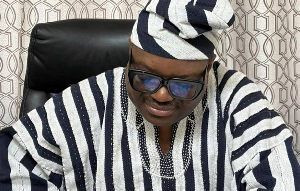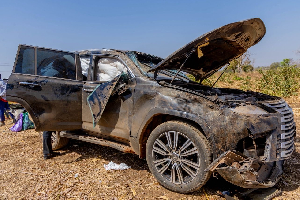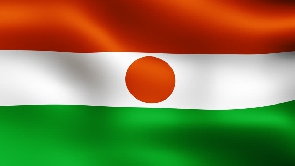Both foreign and local media condone corruption in Africa By Honourable Saka “Sadly, here in the 21st century, all those romantic tales of the press fighting corruption and bringing criminal activity in government to book are all but ancient history”! -Patrick Henningsen
Corruption has been viewed by many observers as a global cancer. Across the world, it can be found in almost every major organization: religious groups, political institutions, educational institutions, financial institutions, the oil industry, within the media itself and many other places.
However, when it comes to corruption in government, Africa has consistently been the spotlight, especially on issues pertaining to bribery or the looting of public funds mostly by the politicians. This has been the major reason why many Africans consistently find politics as a lucrative business. Indeed, these are sad times.
There are however a few passionate individuals who may get into politics as the only viable means to fight corruption and to help improve the living conditions of the people. That notwithstanding, such desires are usually transient as many of such leaders later find themselves in the shadows of the very system they promised to tackle just a little while ago. Once such politicians get into the system and find out how much money they could raise for their families within a short period, the temptation becomes very strong and many of them end up becoming more corrupt than their predecessors. Corruption is a very serious problem that requires a strong political will and a sound moral background to tackle. But unfortunately, even the very people who have strong moral backgrounds are not interested in politics. This has given the corrupt-minded people a field’s day. Fighting corruption in Africa will therefore continue to be a tough battle.
For instance, before winning the elections in 2000, J.A Kuffuor, a former president of Ghana declared “zero tolerance for corruption” as one of his major campaign promises to the people of Ghana. However, after two successive terms in office, in his own confession he said: corruption is as old as Adam.
To many of us Africans, itwasa clear indication that indeed the fight against corruption in Africa is a lost cause. Nevertheless, it is a fight that is worth the try.
Propaganda: A Tool of The Ruling Elites Under normal circumstances, it is the media which ought to put the state institutions in check and help minimize corruption in society. Unfortunately, it is very frustrating that today’s media has rather become the megaphone of most corrupt governments across the Africa and the world. Instead of exposing corruption in government, the media continues to feed the people with propaganda and gross misinformation. Propaganda has been defined by many experts as “a deliberate attempt to persuade people, by any available media, to think and then behave in a manner desired by the source. It is really the means to an end.” Propaganda is a process and in the present age the media have become very useful tools of propaganda. For instance, Noam Chomsky and Edward S. Herman offered a ‘propaganda model’ of how the mainstream media work in the USA. They “trace the routes by which money and power are able to filter out the news fit to print, marginalise dissent, and allow the government and dominant private interest to get their messages across to the public.” In their research, they identified a set of news “filters” through which information must pass, which are: · ownership of the dominant mass media institutions · advertisement as their source of income · the fact that the media itself depends on government and business industries for information. It is therefore not surprising that many of the news items in the state media today are mainly issues that attempt to white-wash government performance, while deliberately ignoring government failures. Meanwhile corporate lobbyists and big businesses of today can also buy the independence of the press itself. As a result, they can even influence “independent research” and manipulate the results such that the outcome will always suit their business interests. For instance, we must always ask ourselves: how genuine can any “independent research” be when such research projects are always financed and completely sponsored by the very corporations that seek to promote an agenda with the outcome of such research? Wouldn’t it be more useful to have a completely independent research body which has no link whatsoever to these corporate lobbyists to be tasked with the sole responsibility of conducting such research? How difficult will it be for some board of directors to finance a research project and will not be able to influence the results? This is the major reason why I have always found the outcome of many of these so-called independent researches to be more questionable. Because, for me, it appears corporations merely pay off their researchers (who may not necessarily be independent), to fine-tuned some “findings” such that these results will suit a particular agenda. Propaganda has been the major problem we have in society today, since businesses will always find a way to meet their profitable interest even if it means twisting the facts. Sadly, the media is in bed with this system and have always remained silent even where there are more questions than answers. How The Media Condones Corruption Corruption has existed in Africa and has become a cancer because; the very institutions that bear the responsibility to help fight this problem do not realize this responsibility. Most unfortunately, some of the media are themselves becoming part of the problem as their continuous silence is creating conducive environment for corruption to flourish in Africa. The foreign press has all the details of the very institutions that facilitate corruption in Africa. Yet, they will never do anything about it. After all it is these moneys that keep their financial institutions and some of the media afloat. In his article: “Hiding Africa’s Looted Funds, Silence of Western Media”, the author expresses his worry about media blackout on the very system that sustains corruption in Africa: “Even though it is a common knowledge that western banks are acting as safe havens for looted funds from Africa, very little attention is received from the western media to expose them. The media tend to focus their energies on the corrupt African leaders, with little or no mention at all, as to where the monies they have stolen are being kept”. Of course the Western press have no interest in exposing how their financial institutions have been facilitating corruption in Africa. But the questions we must ask ourselves are these: where are the local African media? What are they also doing to ensure that such a cancer that threatens Africa’s survival is completely eliminated from the system? Are the local media expecting the western press to take over their responsibilities of fighting corruption in Africa? For how long must corruption in Africa continue before the media does something about it?
The silence of the local media has contributed to the woes of our people. For instance, the oil industries have over the years been causing serious problems in the local communities where this black gold is exploited. Water bodies are usually polluted, with little or no regard whatsoever for the health of people within the community. In the mining sector, health and safety officials have been collaborating with illegal miners as they continue to the waters. Environmental health officials continue to ignore the danger that is being caused the irresponsible disposal of waste across Africa by these foreign companies. In Somalia for instance, millions are dying every day of cancer because of irresponsible waste disposal by the foreign companies who continue to make billions of corporate profits at the expense of the ordinary Somalis.
In spite of these challenges, the media continues to ignore the need to scrutinize the status quo and help bring those responsible to book. Instead, everyday’ discussion has been politics. From morning shows, the newspaper reviews to the late night discussion on TV and radio, everything is always politics. It is as if politics is all that matters in Africa.
Anytime the media focuses attention on a politician, the scenario is always those in opposition, as if corruption in government doesn’t count. Therefore by the time the ruling party goes into opposition, many corrupt politicians would have had a field day, looting the nation for as long as they can afford. All these are indication that the current political framework must be modified to meet the real needs of the people. It cannot be assumed that opposition figures are the only ones that are guilty of corruption. In fact the real corrupt practices are being perpetrated by the ruling elites which often go unchecked. This is the reason why the local African media need to sit up. The government of the day may not investigate itself. The media must therefore take up the responsibility to help expose corrupt practices that threaten the very foundation of our future. The silence of the local media is really worrying. Until then, it must be accepted that the local African media has lost one of its major focus in society. I am therefore challenging the local African media to show some seriousness in the fight against corruption in Africa by focusing on the state institutions and ensuring that all major corrupt practices are exposed to the general public, instead of waiting for these officials to go into opposition before being held accountable.
Honourable Saka The writer is a Pan-African analyst and the founder of the Project Pan-Africa(PPA), an organization that was established to unlock the minds of the African youth to take Africa’s destiny into their hands. The PPA is highly determined to provide the biggest platform that will give exposure to all hidden but exceptional talents in Africa. Please visit us at: www.projectpanafrica.organd support the project. PPA is grateful to ITech Plusand all media partners that support the vision.
Opinions of Wednesday, 17 October 2012
Columnist: Saka, Dr
Fighting Corruption In Africa, The Role Of The Silent Media
Entertainment

Blackmail Saga: Court remands Showboy, case adjourned
Opinions











